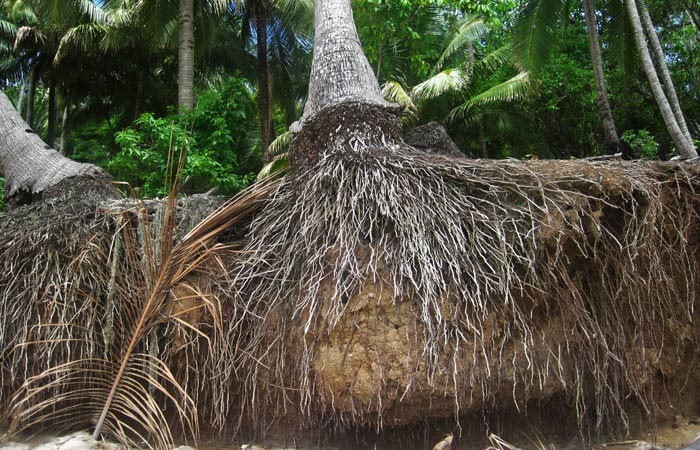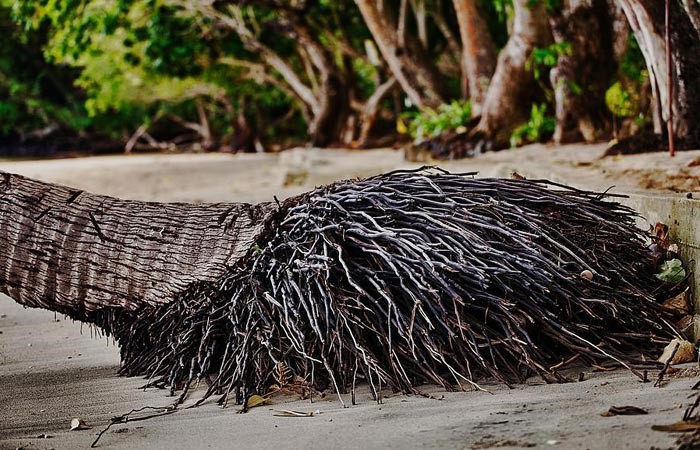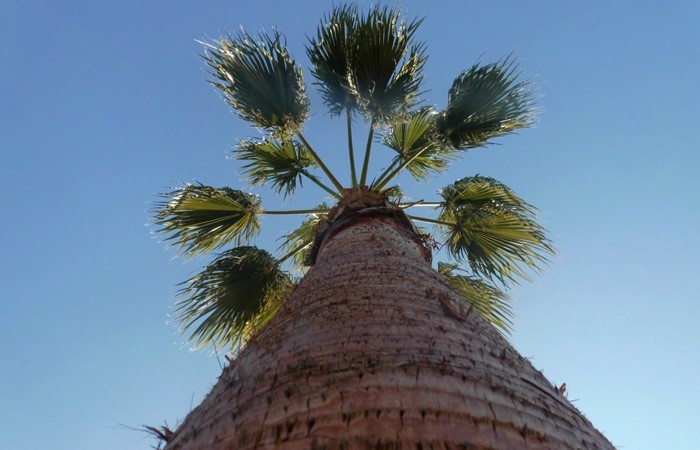Palm Trees Roots System: Everything You Need to Know

Palm trees roots system is truly fascinating. If you think palm tree roots are similar to other tree species, you are not quite right. In this article we are going to investigate the root system of these majestic trees, as well as answering common questions about palm tree roots maintenance, how to remove them, whether they invasive or not, etc. If you are curious about palm trees roots system like us, do not miss this article!
Palm Trees Roots System
As we said, the roots of palm trees is very distinct when you compare it to the trees. Palm trees have a “fibrous root system.” Meaning that palm tree roots don’t grow deeply in the soil. They spread over the soil and penetrate about 36 inches of topsoil. So if this tree is planted in shallow soil, you might palm tree roots near your house.
Palm trees roots system loves sandy soil, which makes it easy for to uproot them (just in case) as well. This is also the reason why the palm trees are blown over during storms and strong winds. Because of the long trunks and large fronds of palm trees, palm trees root system have an essential role in keeping the whole tree structure moist and provide it with certain amounts of nutrients.
Palm Trees Roots System Functions
Palm trees root system absorb moisture from the nearby soil to keep the tree hydrated. They also absorb dissolved minerals like magnesium, iron and manganese which to help the stay green. Palm trees roots system then send the absorbed water and minerals up to the fronds and length of the trunk to keep them healthy and fresh.
Apart from feeding the tree, palm trees root system is responsible for stabilizing and anchoring the long trunk of the tree as well. The fibrous roots system binds the sandy soil (or other types of soil) around themselves by gripping the soil particles.
Palm trees root system have some medical uses too! For example, you can use them to treat gall bladder, urinary infections, and kidney problems. To treat this health problems, boil 4 or 5 roots, and drink it water when cool. If you suffer from Fibrosis, boil 3 to 5 finger long pieces of palm roots and drink it for a few days.
Palm Tree Roots Length
In different palm species such as Bailey Bismarck, Royal, and Canary Island date, although palm trees roots system stays within the top 12 to 36 inches of the topsoil, it grows up to 50 feet away from the trunk horizontally. Palm tree roots become thin as they increase in length.

Are Palm Tree Roots Invasive?
Can palm tree roots damage a wall? Can palm tree roots damage your pool? And many more similar questions are among what palm tree owners ask. But is the palm trees roots system really that invasive?
Let us start with underground pipes. We all have seen large and thick roots of different trees lift the concrete and damage the pipes. However, palm trees roots system cannot cause such damage neither to the concrete nor the pipes. This is because the palm tree roots remain within the topsoil around the tree itself, and they do not penetrate deep enough into the soil to reach the underground pipes.
In addition, because the palm tree roots are thin, they are not strong enough to damage the concrete. But in the cases of large palm trees, the roots may reach to the underground pipe system and entangle with them. If this happens, while transplanting the tree, it is necessary to cut the tree from the trunk and not to uproot it, which may damage the underground pipes.
With that in mind, professional growers recommend planting or transplanting palm tree species at least 12 feet away from a hard surfaces like concrete. The distance lets the palm trees roots system spread at a healthy rate and prevent any concrete damage.
Also, do not forget maintaining your pipe system. To avoid roots growing into leaking pipes, keep an eye for for large water bills with no obvious explanation. The reason may be a yard leak that causes the palm trees roots system to grow close to the underground pipes.

Palm Trees Root System Maintenance
Caring for palm trees is generally not difficult. However, if you have a palm tree in your backyard, it is important to give special attention to it.
As any other root system, palm trees roots system absorbs moisture and nutrients to feed the long, thick trunk and the large leaves. For maintaining palm trees root system and fulfil its water needs, you need to keep it well watered. To ensure the water requirements, try wrapping a soaker hose around the root area to keep the soil moist.
Within its first few months of the tree life, and before the palm tree roots are mature, watering the tree is also important to help it survive. Only after the roots are fully grown, you can reduce the watering to 15 minutes twice a month.
Palm trees are generally tolerant of drought. However, in case of transplanting, you need to keep the main palm trees roots system (the root ball) moist after to make sure that the roots grow long and strong for suitable anchoring.
If you have a container-bound palm, you can skip loosening the coiled palm trees roots system. After transplanting, healthy roots start growing from the root-initiation part and create a wider ball. The coiled palm trees roots system eventually die back as the tree accustoms to the new environment and soil surroundings.
Providing the necessary nutrients of palm trees roots system including magnesium, iron, and manganese is another responsibility. These nutrients protect the green foliage of leaves and prevent them from yellowing.

Palm Tree Root System Removal
If you find it necessary to remove a palm tree, we have a planned approach for you, including palm tree root system removal to prevent future growth. Things that you need for palm tree root system removal are gloves, a tree saw, and a shovel.
- Put on the gloves for protection while working and start with cutting the palm with the tress saw. You need to leave at least 2 feet of the trunk extending above ground.
- Next, dig around the tree trunk using the shovel. Insert the shovel point at a 45-degree angle about 20 inches from the trunk. Work the shovel around the tree for cutting palm tree roots.
- Continue working the shovel point down along the circle created around the cut trunk and dig out the palm tree roots ball. You can use the stump above ground as a leverage to make the process easier. If you have no idea about the size of the root ball that you are going to see, let us give you an example. A palm shorter than 16 feet, normally displays a root ball with a diameter of almost 24 inches.
- After the palm tree root system removal (the root ball), pull and cut large exposed roots from the hole where you removed the root ball.
- Finally, fill the hole after palm tree roots removal with dirt and tamp down to remove all the air pockets completely.
If your palm tree is too huge, you can always count on different companies for palm tree root system removal and cutting palm tree roots. Depending on the factors such as height, health, trunk diameter, and location, the cost of palm tree root system removal would be different.
Now that you know palm trees roots system better, you no longer need to worry about invasive roots or maintaining problems. To avoid any problems with palm tree roots, we recommend choosing a palm species with the right size for your space, so the palm trees root system have enough room to expand.
- In this post:
- Palm Trees Roots System
- Are Palm Tree Roots Invasive?
- Palm Trees Root System Maintenance
- Palm Tree Root System Removal



